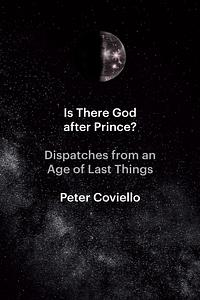Take a photo of a barcode or cover
*Is There God after Prince? Dispatches from an Age of Last Things* by Peter Coviello is a heartfelt exploration of the power of art, culture, and connection in times of uncertainty and looming disaster. Through a series of essays, Coviello reflects on how the things we love—songs, books, movies, and people—become anchors in a world that feels increasingly fragile.
Coviello's essays are a blend of humor, sorrow, and deep critical engagement, as he navigates through a wide range of cultural touchstones, from Prince to Joni Mitchell, *The Sopranos* to *The Shining*. These essays are not just about the works themselves, but about how they intersect with the most intimate moments of life—friendship, love, loss, and the ever-present sense of "endstrickenness" that pervades our current age.
Thank you to the publishers and NetGalley for the opportunity to review a temporary digital ARC in exchange for an unbiased review.
Coviello's essays are a blend of humor, sorrow, and deep critical engagement, as he navigates through a wide range of cultural touchstones, from Prince to Joni Mitchell, *The Sopranos* to *The Shining*. These essays are not just about the works themselves, but about how they intersect with the most intimate moments of life—friendship, love, loss, and the ever-present sense of "endstrickenness" that pervades our current age.
Thank you to the publishers and NetGalley for the opportunity to review a temporary digital ARC in exchange for an unbiased review.
This is often . . . kind of a lot. But being kind of a lot is more or less the theme that weaves the essays together. Coviello is interested in the ways that passions for music, books, movies, and so on, enlivens us, binds us in the kinds of intense relationships that weather decades, a cruel world, and so on.
I found the later essays rougher going, and not just because they concern 2016 onward through the first year of the pandemic (although that's certainly a recipe for rough going). The connections the author is trying to make seem more tenuous and less compelling, at least to me.
I should say, though, that I did read this from end to end, and there's no imperative, necessarily, to do so. dipping in and out of individual parts or chapters is absolutely a viable options, and taking breaks might have rendered me more receptive to some that fell flat for me, but that's now how bathtub reading goes.
I found the later essays rougher going, and not just because they concern 2016 onward through the first year of the pandemic (although that's certainly a recipe for rough going). The connections the author is trying to make seem more tenuous and less compelling, at least to me.
I should say, though, that I did read this from end to end, and there's no imperative, necessarily, to do so. dipping in and out of individual parts or chapters is absolutely a viable options, and taking breaks might have rendered me more receptive to some that fell flat for me, but that's now how bathtub reading goes.
reflective
slow-paced
felt like i read the same essay over and over. could’ve been written by people in my freshman writing class or even high school.
not enough criticism for a criticism book, and not enough personal detail to keep it flowing. clearly coviello wants to write something longer about his ex stepdaughters. he should do that. every essay that brought them up was the same melancholic musing of “how do i stay involved in these lives.” write a memoir.
even the titular essay was not a slam dunk for me (tangent: wolves back).
i wanted so much more than what i got. i did not feel as though this book discovered anything. at first i enjoyed coviello’s modest quality, but how much “honestly” and “i think” can you take in a book of criticism?
yeah. disappointed.
not enough criticism for a criticism book, and not enough personal detail to keep it flowing. clearly coviello wants to write something longer about his ex stepdaughters. he should do that. every essay that brought them up was the same melancholic musing of “how do i stay involved in these lives.” write a memoir.
even the titular essay was not a slam dunk for me (tangent: wolves back).
i wanted so much more than what i got. i did not feel as though this book discovered anything. at first i enjoyed coviello’s modest quality, but how much “honestly” and “i think” can you take in a book of criticism?
yeah. disappointed.


